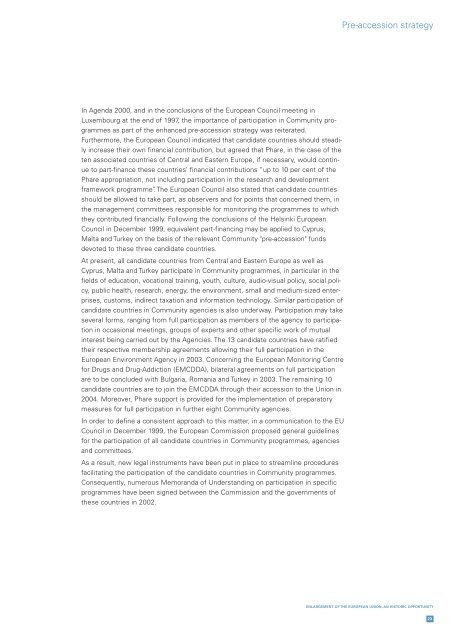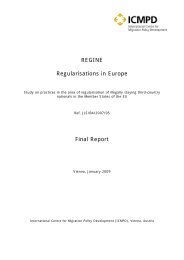European Union Enlargement - An historic opportunity
European Union Enlargement - An historic opportunity
European Union Enlargement - An historic opportunity
You also want an ePaper? Increase the reach of your titles
YUMPU automatically turns print PDFs into web optimized ePapers that Google loves.
Pre-accession strategy<br />
In Agenda 2000, and in the conclusions of the <strong>European</strong> Council meeting in<br />
Luxembourg at the end of 1997, the importance of participation in Community programmes<br />
as part of the enhanced pre-accession strategy was reiterated.<br />
Furthermore, the <strong>European</strong> Council indicated that candidate countries should steadily<br />
increase their own financial contribution, but agreed that Phare, in the case of the<br />
ten associated countries of Central and Eastern Europe, if necessary, would continue<br />
to part-finance these countries’ financial contributions “up to 10 per cent of the<br />
Phare appropriation, not including participation in the research and development<br />
framework programme”. The <strong>European</strong> Council also stated that candidate countries<br />
should be allowed to take part, as observers and for points that concerned them, in<br />
the management committees responsible for monitoring the programmes to which<br />
they contributed financially. Following the conclusions of the Helsinki <strong>European</strong><br />
Council in December 1999, equivalent part-financing may be applied to Cyprus,<br />
Malta and Turkey on the basis of the relevant Community "pre-accession" funds<br />
devoted to these three candidate countries.<br />
At present, all candidate countries from Central and Eastern Europe as well as<br />
Cyprus, Malta and Turkey participate in Community programmes, in particular in the<br />
fields of education, vocational training, youth, culture, audio-visual policy, social policy,<br />
public health, research, energy, the environment, small and medium-sized enterprises,<br />
customs, indirect taxation and information technology. Similar participation of<br />
candidate countries in Community agencies is also underway. Participation may take<br />
several forms, ranging from full participation as members of the agency to participation<br />
in occasional meetings, groups of experts and other specific work of mutual<br />
interest being carried out by the Agencies. The 13 candidate countries have ratified<br />
their respective membership agreements allowing their full participation in the<br />
<strong>European</strong> Environment Agency in 2003. Concerning the <strong>European</strong> Monitoring Centre<br />
for Drugs and Drug-Addiction (EMCDDA), bilateral agreements on full participation<br />
are to be concluded with Bulgaria, Romania and Turkey in 2003. The remaining 10<br />
candidate countries are to join the EMCDDA through their accession to the <strong>Union</strong> in<br />
2004. Moreover, Phare support is provided for the implementation of preparatory<br />
measures for full participation in further eight Community agencies.<br />
In order to define a consistent approach to this matter, in a communication to the EU<br />
Council in December 1999, the <strong>European</strong> Commission proposed general guidelines<br />
for the participation of all candidate countries in Community programmes, agencies<br />
and committees.<br />
As a result, new legal instruments have been put in place to streamline procedures<br />
facilitating the participation of the candidate countries in Community programmes.<br />
Consequently, numerous Memoranda of Understanding on participation in specific<br />
programmes have been signed between the Commission and the governments of<br />
these countries in 2002.<br />
ENLARGEMENT OF THE EUROPEAN UNION, AN HISTORIC OPPORTUNITY<br />
23

















